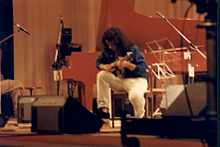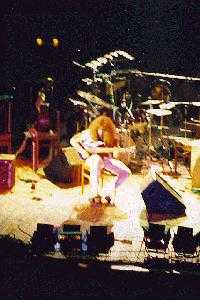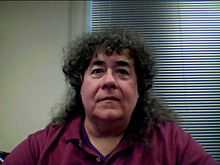John Bruce Wallace
| John Bruce Wallace | |
|---|---|
 John Bruce Wallace | |
| Background information | |
| Born | Calais, Maine, United States |
| Genres | Avant-rock, experimental, free improvisation, Free jazz, industrial, Avant-garde Jazz |
| Occupations | Musician, Composer |
| Instruments | Electric Guitar |
| Years active | 1970–present |
| Labels | Waving Bye Records |
| Website | John Bruce Wallace Official Web Pages |


John Bruce Wallace is a composer, improvisational guitarist,[1] painter, graphic artist, philosopher, and Information Technology consultant. Being recognized for developing a new approach to electric guitar, the prime focus of his musical work is the expansion of the voicings of the electric guitar through improvised compositions. He has a Philosophy degree from the University of Southern Maine and a degree from the University of Maryland University College in Information Systems Management.
Biography
John Bruce Wallace was born in Calais, Maine. Basically a self-taught musician, John picked up guitar in 1966, after having studied clarinet for a period of time. Concentrating at first on rock and the possibilities of instrumental performances in a progressive rock format, he became interested in freely improvised music, and solo performance options. Currently he is a free jazz solo performer interested in freely improvised music with a focus on generating extended sound statements within the options afforded through solo performance. His early influences include Sun Ra, Pink Floyd, Frank Zappa, Rahsaan Roland Kirk, and Jimi Hendrix. Compositions are improvised extemporaneously on solo electric guitar without the use of tape, tape dubbing, computers or synthesizers. The improvised compositions often incorporate sonorous multi-tonal qualities, dense, interwoven passages embellished with harmonic and micro-tonal sound statements, or silence further defined by irregular syntaxed rhythms and primitive beats.[2] His recordings have received considerable air play on alternative and college radio[3][4][5] across North America, Western and Eastern Europe, along with reviews in leading trade journals and press. Artists on shared performance billings have included: Tim Hodgkinson, Evan Ziporyn, John King, Vladimir Tarasov, ZGA, Enver Izmailov, Burhan Ocal and Jazz Band Arkhangel'sk.[6] Tours have included festivals in Russia and Lithuania, at the Vilnius Jazz Festival.[7] His music was invited for performance consideration at the American Pavilion during the 1991 São Paulo Art Biennial, in São Paulo, Brazil. Academically he attended and holds a degree in Philosophy from the University of Southern Maine and the University of Oregon (as an exchange student) where he found interest in Philosophy and Political Theory with strong interest in Hegel, Marx, Husserl, Wittgenstein, and Nietzsche. He also developed an interest in Information Technology and has a degree from the University of Maryland University College in Information Systems Management. His other artistic interest is in the Visual Arts - painting and graphic arts. He has melded these diverse interests into inquires into how Consciousness and Artificial Intelligence influence approaches to the Imagination and the Creative Mind. He maintains devotion to each of these interests. In the early 1990s John became afflicted with Meniere's Disease which presented unique challenges to performances and recording, the resolution of these allowed an expansion of thought as to how sound production was perceived in terms of amplification and microphone placement.
Music Critics' Comments
"Wallace is one of those rare exceptions" (Charles S. Russell, EAR MAGAZINE, New York, NY).[8] "[He has] [a]n aggressive, wailing guitar sound—astonishing and extremely individual" (Grigory Valov, TIF, Arkhangel'sk, Russia). "Wallace interprets the improvised pieces with many harmonics, with inconsistent rhythms over fractured changes" (Philippe Renaud, NOTES, Nantes, France).[9] "Sinuous solo guitar improvisations...rippling, resonant sound" (Mark Jenkins, Washington City Paper, Washington, DC). "He invented a new technique of playing while continuously changing the pitch of his electric guitar" (Svetlana Korel'skaya, ARKHANGEL'SK, Arkhangel'sk, Russia).[10] He deals with free improvisation within the modern guitar tradition exploring the technical possibilities of the instrument in an individually embossed tonal language (Bernd Jahnke, Jazz Podium No. 1 1992).[11] "[He employs] strange techniques and shows a definite John Cage, Fred Frith influence...[The music is] great for people who like Petr Eben, Stravinsky, and maybe even Hutchenson" (Teo Graca, The Insider No. 13, Washington, DC). "Wallace can very obviously play...[L]engthy meditations, often very spiked and twisted...often wild and unpredictable" (Ken Egbert, Option, Santa Monica, CA).[12] "[The] solo electric-guitar improvisations…[v]iolent yet lyrical, feature squeals, buzzes, squawks, and other Fripperies…non-overdubbed electric attack and decay...[H]is playing is a lot less predictable than that of many guitar warriors, and the best of it has a savage beauty that Eddie Van Halen couldn't achieve with six months of overdubs" (Mark Jenkins, Washington City Paper, Washington, DC).[13] "His sizzling electric distortion...thick and saturated tone captures a kind of steel industrial sound, gently relating to the development of the urban situation, and technological society on which he comments, and to the worldly issues faced by modern development. Wallace's music comes out like a giant question with no apparent answer...tapping the human interior's post pro-harmonic feedback" (LaDonna Smith in the improvisor; vol. XI, Birmingham, Alabama).[14]
Philosophy
Areas of Philosophical Interest: Philosophy of Mind, Consciousness, Thought, Artificial Intelligence, Philosophy of Physics, Quantum Theory, Relativity Theory, Chaos Theory, Mental Acts, Imagination, Cognition, Theories of Creativity, Epistemology, Perception.
He has published a monograph in Philosophy on Solipsism and Consciousness titled: Genesis: Involvement: Generation (Genesis),[15][16] as-well-as papers in Philosophy on Consciousness, and in Information Technology on Information Assurance. Genesis deals with the philosophical issues concerning the problems of solipsism: the search for the 'self' and its relation to the world. Addressing such traditional questions as the nature of epistemological certainty, metaphysics, and the adequacy of logic and science as foundations of thought, the author expands his investigation to include an examination of the individual and the social sciences. The author draws upon the thought of various philosophers, contending that both metaphysical and epistemological solipsism are faulty notions seeded in an equally faulty endeavor 'The Quest for Certainty', concluding that it is necessary to return to the Socratic maxim, 'Know Thyself', as a pluralistic field of consciousness.[15]
Discography
- "Impaled Dreams of the Believer"
- "Riding the Cusp of Time"
- "Electro Static Time Line"
- "Loud Noises In A Corner: Engagements On Urban Terrain"
- "John Bruce Wallace In Russia"
- "Plumbing the Depths of Reason"
- "Krank Cauls Disturb My Sleep"
Links to Sound Bites

Publications
- "Bioterrorism: Anthrax, Sarin, and Smallpox What Can Be Done", Paper on the prospects of disaster recovery in the event of a bioterrorism attack, to be reprinted as a chapter in an ICFAI anthology tentatively titled Bioterrorism forthcoming
- "Can Access Consciousness Qualify as Computer Consciousness? Or, So What If My Computer Can't Cry!", Philosophy paper on ascribing Access Consciousness, as presented by Ned Block, to Artificial Intelligence, accepted for poster presentation at Toward a Science of Consciousness Conference 2009 (TSC) in Hong Kong, the Center for Consciousness Studies, University of Arizona
- Genesis, Involvement, Generation, University Press of America, a Rowman and Littlefield imprint, Washington, DC, 1981, A Monograph in Philosophy on Solipsism, Philosophy of Mind, Consciousness, Reality, and the Self
References
- ↑ Lord, Tom (December 2000). The jazz discography. Lord Music Reference. ISBN 978-1-881993-23-0. Retrieved 11 August 2011.
- ↑ "All About Jazz: John Bruce Wallace". All About Jazz. Retrieved 12 June 2012.
- ↑ "WCBN Playlist for May 17, 2011". WCBN-FM 88.3 FM, Ann Arbor, MI. Retrieved May 23, 2012.
- ↑ "WMPG 90.9 Playlist for October 17, 1998". WMPG-FM 90.9 FM, Portland, ME. Retrieved May 25, 2012.
- ↑ "WFMU Playlist June/July 1994". WFMU 91.1 FM, East Orange, NJ. Retrieved 28 May 2012.
- ↑ "Vilnius Jazz Festival History 1991". Vilnius Jazz Festival. Retrieved May 25, 2012.
- ↑ "Vilnius Jazz Festival". Retrieved May 25, 2012.
- ↑ Russell, Charles. "Ear Magazine, Earviews: John Bruce Wallace Krank Cauls Disturb My Sleep". Ear Magazine Vol 14 No 9 December - January 1989-1990. Retrieved 28 May 2012.
- ↑ Renaud, Philippe. "Review: john Bruce Wallace Plumbing the Depths of Reason". Notes 38/39 October. Retrieved 28 May 2012.
- ↑ Korel'skaya, Svetlana. "Stages: And All the Same, It's Jazz". Arkhangle'sk. Retrieved 28 May 2012.
- ↑ Jahnke, Bernd (1992). "Presentation Zeitgenoessischer Spielarten Improvisierter Musik Vilnius '91". Jazz Podium No. 1 1992. Retrieved 24 April 2012.
- ↑ Egbert, Ken. "Review: John Bruce Wallace, Plumbing the Depths of Reason". Option Nov/Dec 1990. Retrieved 28 May 2012.
- ↑ Jenkins, Mark (October 28, 1994). "Picking Himself Into A Corner". Washington City Paper. Retrieved 23 April 2012.
- ↑ Smith, LaDonna (March 1996). "reviews, reviews, reviews, reviews, reviews Loud Noises in a Corner: Engagements on Urban Terrain John Bruce Wallace - solo guitar". the improvisor. Retrieved May 25, 2012.
- ↑ 15.0 15.1 "Amazon.com Books". Genesis: Involvement: Generation. Retrieved May 25, 2012.
- ↑ "Google Books". Genesis: Involvement: Generation. Retrieved May 25, 2012.
External links
- John Bruce Wallace Official Web Pages
- John Bruce Wallace page at All About Jazz
- The JAZZ Discography - by Tom Lord
- Vilnius Jazz Festival
- Praesentation zeitgenoessischer Spielarten improvisierter Musik Vilnius '91, Bernd JAHNKE (Jazz Podium No.1 1992)
- Jenkins, Mark, Picking Himself Into A Corner, Washington City Paper
- Статьи « ЖУРНАЛ НЕЧЕЛОВЕЧЕСКОЙ МУЗЫКИ "РЕЗУЛЬТАТЫ-ONLINE"»
- Korolenko, P.; "Arkhangel'sk-91, International Jazz Days" in BOJIHO, Arkhangelsk, Russia, October 1991, p.13
- List of Free Improvising Musicians and Groups
- CKLN Radio Notice of Playlist Airtime
- WMFU Playlist July 1989
- Teo Graca review in the Insider No. 13
- the improvisor
- Loud Noises in a Corner: Engagements on Urban Terrain John Bruce Wallace - solo guitar review by LaDonna Smith in the improvisor; vol. XI, March 1996
- Interview in Cadence Vol 19 No 1 January 1993 pages 37-38
- Review by Robert Iannapollo of Plumbing the Depths of Reason in Cadence May 1992 page 20
- Toward a Science of Consciousness Conference 2009, Hong Kong, China
- The Center for Consciousness Studies, University of Arizona
- Meniere's disease